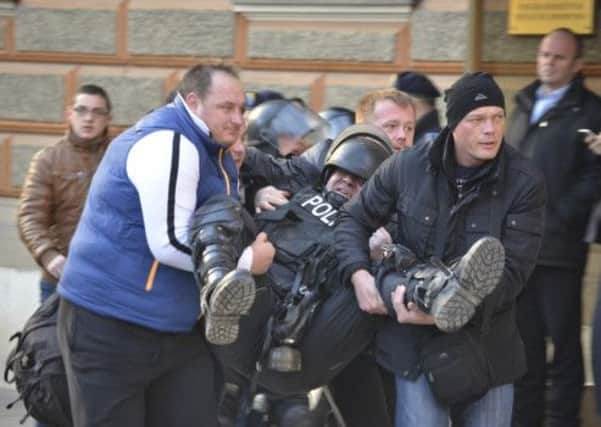Bosnia: Street battles rage over jobs anger


Protests were largely confined to the Croat-Muslim Bosniak half of the Balkan country.
Police remained out in force even after protesters dispersed on Friday in the three flashpoint towns, including the capital, Sarajevo. All shops were closed and the streets were littered with glass and debris.
Advertisement
Hide AdAdvertisement
Hide AdPolice in Sarajevo fired rubber bullets at thousands of protesters who set fire to the headquarters of the cantonal government and to a section of the presidential building on Friday.
“This is so sad,” said a woman watching the cantonal building burning. “It took four years of war to destroy it and vandals now burned it in one day. This is just as in 1992.”
By yesterday afternoon Bosnia appeared to be drawing back from three days of unprecedented unrest.
In a conciliatory gesture, citizens swept up rubble left from the rioting in the northern city of Tuzla. Small protests were held in Sarajevo, and in northwestern Bihac, where protesters threw stones at the home of the head of the local government.
Many Bosnians are furious over the nearly 40 per cent unemployment rate and post-war privatisations which have enriched a few oligarchs but impoverished most of the middle class.
On Friday protesters even tried to force their way into the presidential building, but were repelled by special police firing water cannon. Around 145 people were injured in Sarajevo, including 93 policemen.
Several thousand protesters in the southern town of Mostar stormed two local government buildings and also set fire to the city hall. Police did not intervene.
In Tuzla, once the industrial heart of northern Bosnia, protests over factory closures again turned violent.
Advertisement
Hide AdAdvertisement
Hide AdDemonstrators stoned and torched two local authority buildings and clashed with police. Trapped by the flames, some leapt from windows to escape.
“I think this is a genuine Bosnian spring. We have nothing to lose,” said Almir Arnaut, an unemployed economist and activist from Tuzla. “There will be more and more of us in the streets, there are around 550,000 unemployed people in Bosnia,” he added.
At least nine people were injured in Tuzla, police said, including two police officers, one of them seriously.
In Sarajevo, two cars and a police guard’s cabin were set on fire in front of the presidential building.
A government building in the central town of Zenica was also set alight and around 55 people were injured, including 23 police officers.
Protesters, many of whom heeded calls on Facebook to take to the streets, chanted “Thieves!” and “Revolution!”
The Zenica and Tuzla cantonal governments, in charge of local issues such as the sale of state assets, said on Friday that their chiefs had resigned in the face of the protests.
In Banja Luka, capital of Bosnia’s Serb half, some 300 people staged a peaceful march to call for unity among the countries different ethnic groups.
Advertisement
Hide AdAdvertisement
Hide Ad“We are all citizens of Bosnia and all have the same difficult lives here,” organiser Aleksandar Zolja, president of the non-governmental organisation, the Helsinki Citizens’ Assembly, told the rally.
Bosnia has one of the highest unemployment rates in Europe, with more than one in four of the workforce jobless in the former Yugoslav republic.
The unrest is unprecedented in post-war Bosnia, where Serbs, Croats and Muslim Bosniaks have tolerated political stagnation for years rather than risk a return to conflict.
Bosnia’s recovery has been hostage to an unwieldy power-sharing system based on ethnic quotas set in the United States-brokered Dayton peace deal that ended the war, in which an estimated 100,000 people died.
Ethnic politicking has stymied governance and has left Bosnia trailing its ex-Yugoslav peers on the road to membership of the European Union, which neighbouring Croatia joined last year.
“What is happening is what was long expected to happen. If some people need to resign, they should resign,” said Zeljko Komsic, the Croat member of the tripartite presidency.
Political instability and Bosnia’s reputation for corruption have scared off foreign investment, analysts say.